
Yale College is the undergraduate college of Yale University. Founded in 1701, it is the original school of the university. Although other Yale schools were founded as early as 1810, all of Yale was officially known as Yale College until 1887, when its schools were confederated and the institution was renamed Yale University. It is ranked as one of the top colleges in the United States.

The University of Georgia is a public land-grant research university with its main campus in Athens, Georgia, United States. Chartered in 1785, it is one of the oldest public universities in the United States. It is the flagship school of the University System of Georgia.

Augusta University (AU) is a public research university and academic medical center in Augusta, Georgia. It is a part of the University System of Georgia and has satellite medical campuses in Savannah, Albany, Rome, and Athens. It employs over 15,000 people, has more than 56,000 alumni, and is accredited by the Southern Association of Colleges and Schools.
The Lamar Dodd School of Art is the art school of the Franklin College of Arts and Sciences at the University of Georgia (UGA) in Athens, Georgia, United States.

Josiah Meigs was an American academic, journalist, and government official. He was the first acting president of the University of Georgia in Athens, where he implemented the university's first physics curriculum in 1801, and also president of the Columbian Institute for the Promotion of Arts and Sciences.

David Crenshaw "Uncle Dave" Barrow Jr. served as chancellor of the University of Georgia (UGA) in Athens from 1906 until his resignation in 1925.
Charles Mercer Snelling was the chancellor of the University of Georgia (UGA) in Athens, Georgia, from 1925 to 1932 and the first chancellor of the Georgia Board of Regents of the University System of Georgia (1932–1933). All UGA leaders after Snelling have been referred to as president.
Mary Dorothy Lyndon was the first female graduate from the University of Georgia (UGA) in Athens, Georgia.
The Daniel B. Warnell School of Forestry and Natural Resources (WSFNR) is a college within the University of Georgia (UGA) in Athens, Georgia, United States.
The College of Agricultural and Environmental Sciences (CAES) is the agricultural college of the University of Georgia, a public land-grant research university in Athens, Georgia.
The College of Public Health (CPH) is a college within the University of Georgia (UGA) in Athens, Georgia, United States.

The School of Public and International Affairs, also referred to as SPIA, is a political science, international affairs and public policy school within The University of Georgia (UGA) in Athens, Georgia, United States. It is the fourth ranked public affairs school in the United States.
The University of Georgia College of Veterinary Medicine is a college within the University of Georgia (UGA) in Athens, Georgia, United States and is a top 10 ranked veterinary school.
The University of Georgia College of Family and Consumer Sciences (FACS) is a college within the University of Georgia (UGA) in Athens, Georgia, United States.

The University of Georgia College of Pharmacy is a college within the University of Georgia (UGA) in Athens, Georgia, United States.
Jett Thomas was an American military officer, politician, and builder who served as a member of the Georgia House of Representatives and participated in the early construction of the University of Georgia.
The Odum School of Ecology is a school within the University of Georgia and the successor of the UGA Institute of Ecology. It is named after Eugene Odum, renowned UGA biologist, the father of ecosystem ecology, and the founder of the Institute.
Housing at the University of Georgia is managed by the Department of University Housing. On campus housing for undergraduate students is divided into ten communities, and for graduate students into three communities.
The University of Georgia Computer Science Major is part of the UGA School of Computing, formerly known as the Computer Science Department. It operates under the joint administration of the Franklin College of Arts and Sciences and the University of Georgia College of Engineering. This restructuring occurred due to the rapid growth in the computer science major at the University of Georgia. While the original Computer Science department was established in 1984, the School of Computing was established on July 1, 2022.
The University of Georgia's main campus sits across from the college town of Athens, Georgia, whose dominant architectural themes are Federal—the older buildings—and Classical and Antebellum style. The university is home to the University of Georgia Campus Arboretum.









